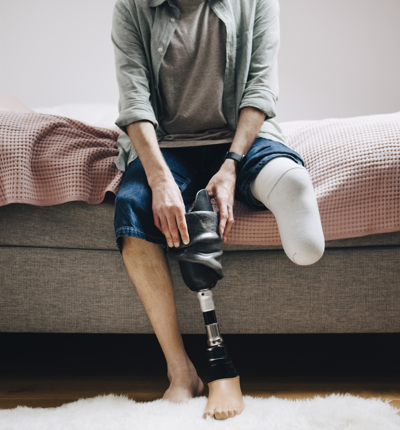
A life rewritten: unlocking new paths after amputation
The loss of a limb can significantly impact a person's life, but with the right support, including rehabilitation and financial stability, a legal claim can help build a positive future. Learn how our expert team can guide you through the process.
Posted on 13 November 2024
The loss of a limb can significantly impact a person's life, but with the right support, including rehabilitation and financial stability, a legal claim can help build a positive future. Learn how our expert team can guide you through the process.
A serious injury can happen to anyone; each year, countless individuals face the profound changes that come with life after limb loss. NHS England data shows between 2008-2022 there were in the region of 20,000 amputations undertaken in hospitals each year.
Whether the result of a work or road traffic accident or a medical condition, adapting to a new way of life can be challenging. Understanding the options available for support, including making a personal injury claim with specialist lawyers, can make a significant positive difference when navigating this journey.
The role of a claim in amputation recovery
Losing a limb is a traumatic time and, in many ways, it rewrites the future. When we first meet our clients, many are in the early stages of life as an amputee. This is when it's most important to get the support you need.
Compensation can play a pivotal role in obtaining funding for rehabilitation aids, contributing to both financial stability and overall well-being. This process helps ensure that medical, psychological, and daily living needs are adequately met, fostering a foundation for personal growth and renewed independence.
Comprehensive rehabilitation support explained
A tailored rehabilitation plan is crucial for optimal recovery. As part of our role managing an amputee claim, we take the time to understand each client’s needs and priorities so we can help secure funding for the rehabilitation support needed.
After appointing a dedicated specialist case manager, an Immediate Needs Assessment (INA) is conducted to determine the specific requirements of each individual. This includes evaluating needs for prosthetics, home modifications, and practical and psychological support. The report assists with addressing both physical and emotional aspects of recovery, ensuring a holistic approach is taken.
The report will cover questions including the care, support, treatment and/or therapy, aids, equipment and adaptations needed to give that person the best possible quality of life.
The INA recommendations will also depend on what rehabilitation stage our client is currently at. It might involve private prosthetic limb assessment and provision including different types of prosthetics such as specialist bespoke sports limbs or the consideration of osseointegration.
The assessment will also show what lifestyle changes are needed, covering home aid, equipment and adapted vehicles. In some cases, a new or rental property might be required if the home cannot be modified to suit future needs. The assessment will also outline what support is required for aspects of day-to-day life such as household tasks, childcare or gardening, so the individual can focus on their home life and rehabilitation.
Planning for long-term well-being
Recovery encompasses more than immediate physical healing; it also involves long-term life planning to help write a positive future. The next part of reshaping the future are considerations such as returning to education or employment and resuming previously enjoyed activities with any appropriate adaptations.
A rewritten life can also provide an opportunity to explore and develop new hobbies and interests, and even retrain and embark on a change of vocation or career that would previously not have been considered. We make sure our clients have access to advice, support, and equipment to help individuals refine their future path and maintain the best possible quality of life.
It’s important to remember that after the loss of a limb, a person's needs can change over time. As part of the claim, we understand the likely impact of ageing on a client’s mobility and energy levels. Prosthetic requirements may change over time, such as lighter prostheses needed in later years, or reduced use due to greater reliance on a wheelchair. There could also be a need for increasing or introducing care and support. These are the types of factors that need to be borne in mind when thinking about the requirements for long-term accommodation for amputee clients and the required settlement amount.
The importance of informed decision-making
Making informed decisions regarding rehabilitation and claims is essential. Understanding the benefits and processes involved empowers individuals to take control of their recovery journey.
There are many amputee charities and support groups that can help guide you through this time, such as LimbPower, who are a specialist amputee charity that we work at Leigh Day. They help to bridge the gap between hospital rehabilitation and community and school engagement to support both new and existing amputees with their physical, social and mental well-being. Through their network of Physical Activity Advisors, they have outreach services at limb centres across the UK. We are also very proud to partner with LimbPower on a Welfare Benefits project, helping amputees access the welfare system post-injury.
If you wish to seek legal advice or amputation claim compensation for an incident that was not your fault, our specialist catastrophic injury lawyers are ready to assist you. You can call us to find out more about how we can help you on a completely no-obligation basis and in strict confidence. We are happy to provide you with advice on the first steps of starting a legal claim, to explain the no-win, no-fee solicitor structure and to answer any queries you may have.
Our personal injury lawyers are here to support you with your claim and rehabilitation.

